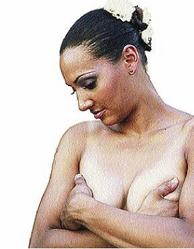
Cancer is probably the most feared disease in the world. The general term cancer is used to describe a group of diseases that can affect any part of the body. There are more than 100 different types of cancers. Other terms for cancer include growths, malignant tumours and neoplasms.
One defining feature of cancer is the rapid appearance of abnormal cells which grow beyond their usual boundaries, and which can invade adjoining parts of the body and spread to other organs, a process referred to as metastasis.
CANCER A COMMON KILLER
Cancer is one of the leading causes of death in the world, particularly in developing countries. In 2005, out of 58 million deaths worldwide, 7.6 million people died of cancer.
Based on projections by the World Health Organisation (WHO), cancer deaths will continue to rise with an estimated nine million people dying from cancer in 2015, and 11.4 million dying in 2030.
Cancer affects everyone - the young and old, the rich and poor, men, women and children - and represents a tremendous burden on patients, families and societies. More than 70 per cent of all cancer deaths occur in low- and middle-income countries, where resources available for prevention, diagnosis and treatment of cancer are limited or non-existent.
CANCER IN JAMAICA
In 2005, cancer killed approximately 3,500 people in Jamaica, 1,600 of whom were under the age of 70.
BREAST CANCER is the most COMMON CANCER in WOMEN in JAMAICA
PROSTATE CANCER is the most COMMON CANCER in MEN in JAMAICA.
WHAT CAUSES CANCER TO DEVELOP?
The common belief that doctors do not know what causes cancer is a lie. Cancer occurs because of changes in the genes of cells that are responsible for cell growth and repair. These changes are the result of damage to the genes primarily from chemicals called free radicals. Other powerful substances called carcinogens can also damage genes and cause cancer. Many of these causes of cancer have to do with our lifestyle.
Cancer arises from one single cell. The transformation from a normal cell into a tumour cell is a multi-stage process that may take years to develop. It is often initiated by the creation of excess free radicals in the body. Examples of carcinogens (cancer-causing agents) include:
Physical carcinogens, such as ultraviolet light (UV) and ionising radiation (e.g. X-rays).
Chemical carcinogens, such as some prescription drugs, hormones, benzopyrene, formaldehyde, aflatoxins (food contaminants), and fibres such as asbestos.
Biological carcinogens, such as infections by viruses, bacteria and parasites. (Infections and inflammation are major producers of excess free radicals.)
One-fifth of cancers worldwide are due to chronic infections:
Hepatitis B viruses (causing liver cancer)
Human papilloma viruses (causing cervix cancer)
Helicobacter pylori (causing stomach cancer)
Schistosomes (causing bladder cancer)
HIV (causing Kaposi sarcoma and lymphomas).

Breast and prostate cancers are among the most virulent forms of the disease. Contributed
FOUR ANSWERS TO CANCER
The WHO suggests these four elements for an anti-cancer programme:
1. Prevention
2. Early detection
3. Diagnosis and treatment
4. Palliative care
PREVENTION
This is the best approach as the cancer may remain hidden in your body for many years before it can be diagnosed. According to the WHO, at least 40 per cent of cancer could be prevented, mainly by not using tobacco, having a healthy diet, being physically active, avoiding obesity and preventing infections that may cause cancer.
The most important risk factors for cancer that you can control are:
Diet: A high consumption of fresh fruit and vegetables (nine or more servings per day) and a low consumption of animal fats will tremendously reduce your risk from a wide variety of cancers.
Tobacco use: responsible for up to 1.5 million cancer deaths per year (60 per cent of these deaths occur in low- and middle-income countries);
Overweight, obesity and physical inactivity - together responsible for 274,000 cancer deaths per year;
Harmful alcohol use (more than one to two drinks per day) - responsible for 351,000 cancer deaths per year;
Sexually transmitted, e.g. human papilloma virus infection - responsible for 235,000 cancer deaths per year;
Air pollution (outdoor and indoor) - responsible for 71,000 cancer deaths per year;
Occupational carcinogens - responsible for at least 152,000 cancer deaths per year.
Cancer prevention should be combined along with other chronic diseases with which cancer shares common risk factors, such as cardiovascular diseases, diabetes, chronic respiratory diseases and alcohol dependence. In other words, when we prevent cancer, we prevent other illnesses as well.
The bottom line is that a great deal of unnecessary human suffering, pain and premature deaths can be avoided by simple changes in our lifestyle.
Email Dr. Anthony Vendryes at info@anounceofprevention.org, log on to www.anounceofprevention.org, or listen to An Ounce of Prevention on POWER 106FM on Fridays and Saturdays at 8:00 p.m.

